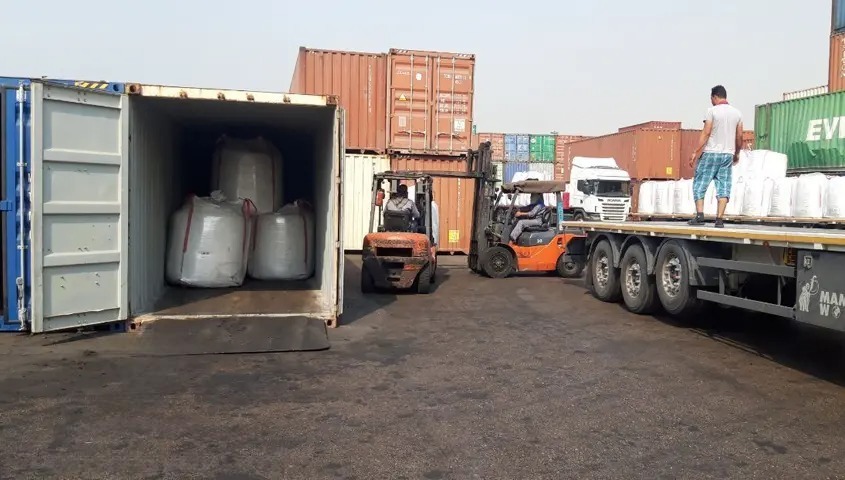Soda Ash Dense Supplier From Turkey And Dubai-UAE

Description of Soda Ash Dense
Soda Ash Dense, also known as Dense Sodium Carbonate (Na₂CO₃), is a white, odorless, granular alkali compound widely used in numerous industrial applications. Compared to light soda ash, the dense grade has a higher bulk density, improved handling characteristics, and enhanced performance in high-temperature and heavy-duty industrial processes.
As a strong alkaline chemical, soda ash dense plays a critical role in glass manufacturing, water treatment, metallurgy, and chemical production due to its ability to neutralize acids and provide a stable source of sodium ions.
Physical Properties
-
Appearance: White, granular solid
-
Bulk Density: 0.9 – 1.1 g/cm³ (higher and more compact than light soda ash)
-
Solubility: Easily soluble in water; approximately 215 g/L at 20°C
-
Melting/Decomposition Point: Decomposes around 851°C (1564°F) before melting
-
Hygroscopicity: Slightly hygroscopic; should be stored properly to avoid caking
Chemical Properties
-
Chemical Formula: Na₂CO₃
-
Molecular Weight: 105.99 g/mol
-
pH (1% solution): Approximately 11.5 (strong alkaline nature)
-
Reactivity:
-
Reacts with acids to form carbon dioxide, water, and salts
-
Undergoes mild hydrolysis in water, producing a weakly basic solution
-
Applications and Uses of Soda Ash Dense
Thanks to its alkaline properties and chemical stability, soda ash dense is a key raw material across various industrial sectors.
1. Glass Manufacturing
Soda ash dense is the primary alkali source in glass production.
-
Flat Glass: Used in manufacturing windows, mirrors, and automotive glass, where it lowers the melting point of silica and improves product clarity.
-
Container Glass: Essential for bottle and jar production, providing chemical durability and stability.
-
Specialty Glass: Applied in the production of fiberglass, optical fibers, and laboratory glassware.
2. Chemical Industry
-
Sodium Derivatives: Acts as a precursor for manufacturing sodium silicate, sodium bicarbonate, sodium phosphate, and other sodium compounds.
-
Acid Neutralization: Used to neutralize acidic effluents and maintain balanced pH in industrial processes.
3. Detergents and Cleaning Agents
-
Builder in Detergents: Improves washing performance by softening water and enhancing surfactant efficiency.
-
Industrial Cleaners: Removes oil, grease, and mineral deposits in heavy-duty cleaning formulations.
4. Water Treatment
Used to raise pH in municipal, industrial, and pool water systems, preventing corrosion and stabilizing alkalinity.
5. Pulp and Paper Industry
During pulping and bleaching, soda ash dense helps separate cellulose fibers and enhances paper whiteness and brightness.
6. Textile Processing
-
Dye Fixation: Assists in binding dyes to fibers during coloring processes.
-
pH Regulation: Maintains optimal alkalinity throughout textile manufacturing.
7. Metallurgy and Mining
Used as a fluxing agent in extracting metals such as copper, zinc, and lead, improving separation efficiency and metal purity.
8. Food and Beverage Industry
-
Food Additive (E500): Serves as an acidity regulator and anti-caking agent.
-
Leavening Agent: Helps dough rise in bakery applications.
9. Environmental Protection
-
Flue Gas Treatment: Used in desulfurization systems to remove sulfur dioxide (SO₂) from exhaust gases, reducing emissions.
-
Soil Neutralization: Corrects acidic soils, improving agricultural productivity.
10. Oil and Gas Industry
In drilling operations, soda ash dense maintains pH and alkalinity of drilling fluids, ensuring optimal performance and borehole stability.
11. Ceramics and Enamels
Improves melting behavior and enhances durability, smoothness, and shine of ceramic glazes and enamel coatings.
12. Other Applications
-
Fire Extinguishers: Used in the production of dry chemical extinguishers.
-
Adhesives and Sealants: Enhances bonding performance and chemical stability.
Difference Between Light and Dense Soda Ash
Although both products share the same chemical composition (Na₂CO₃), they differ in physical form, bulk density, and industrial applications.
| Property | Soda Ash Light | Soda Ash Dense |
|---|---|---|
| Bulk Density | 0.5 – 0.6 g/cm³ | 0.9 – 1.1 g/cm³ |
| Form | Fine powder | Granular solid |
| Production Method | Ammonia-alkali process | Solid-phase or natural alkali process |
| Main Uses | Detergents, chemicals | Glass, water treatment, metallurgy |
| Price | Lower | Slightly higher due to higher purity and density |
Handling, Storage, and Transportation
Soda ash dense should be stored in dry, covered, and well-ventilated areas to avoid moisture absorption. Use sealed packaging to prevent contamination and caking.
Container Loading
-
20′ Container: ≈ 25 metric tons
-
40′ Container: ≈ 27 metric tons
Packing Details
-
25 kg or 50 kg PE bags
-
1000 kg PP big bags
-
1250 kg jumbo bags
All packaging options are designed for safe transport and long-term storage of soda ash dense in various climates.
Technical Data Sheet of Soda Ash Dense (Sodium Carbonate)
| CHEMICAL COMPOSITION | UNIT | MIN | MAX |
|---|---|---|---|
| SODIUM CARBONATE | %wt | 99.2 | 99.6 |
| SODIUM CHLORIDE | %wt | 0.3 | 0.4 |
| SODIUM BICARBONATE | %wt | — | 0.1 |
| SODIUM SULFATE | %wt | — | 0.1 |
| IRON | Ppm | 30 | 40.0 |
| LOSS ON HEAT | %wt | — | 0.2 |
| MOISTURE | %wt | — | 02 |
| Ni | Ppm | — | 30.0 |
| Cr | Ppm | — | 10.0 |
| Mn | Ppm | — | 10.0 |
| Cu | ppm | — | 30.0 |


